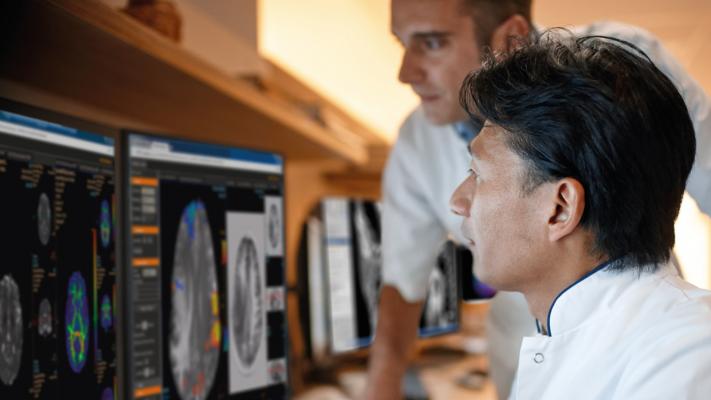
November 20, 2018 — Ahead of the 2018 Radiological Society of North America Annual Meeting (RSNA), Nov. 25-30 in Chicago, Philips announced the introduction of the IntelliSpace Discovery 3.0 platform. IntelliSpace Discovery 3.0 is a comprehensive, open platform to enable the development and deployment of artificial intelligence (AI) assets in radiology, with the aim to support radiologists in their clinical and translational research.
Solutions that leverage AI have the potential to improve patient care and increase the efficiency of care delivery. However, there are challenges when it comes to introducing AI into healthcare clinical practice. Health systems are consistently faced with questions on how to collect and prepare high-quality data, which methods of training and validating the tools are most appropriate, and how to deploy AI without disruption. Philips combines AI and other technologies with knowledge of the clinical and operational context in which they are used – a people-centered approach called ‘adaptive intelligence’ – to develop integrated solutions that adapt to the needs of healthcare providers.
IntelliSpace Discovery is already used for the development of radiology applications for rendering, segmentation and quantification. For example, it is being used for research and clinical validation, and subsequently the tools/applications can be deployed into the radiology workflow on the Philips IntelliSpace Portal. With the introduction of IntelliSpace Discovery 3.0, the platform now provides research applications and tools for radiologists to aggregate, normalize and anonymize data, which can be visualized and annotated to ‘train’ and validate deep learning algorithms. They can then easily deploy these algorithms as plug-in apps into the research workflow to analyze new datasets and help facilitate clinical research in radiology, oncology, neurology and cardiology.
“We use IntelliSpace Discovery to bring our research activities to the next level. Everybody is talking about artificial intelligence. We are making our own deep learning AI algorithms,” said Prof. David Maintz, head of the Department of Radiology of the University Hospital Cologne in Germany.
The building blocks of IntelliSpace Discovery include:
- Front End Applications – Integration with existing clinical infrastructure provides seamless access to vendor-agnostic and multimodality data-sets, and research advanced visualization tools allow data to be prepared and processed for AI training with existing AI tools;
- Study Management – Fully scalable infrastructure contains a vendor-neutral research archive for structured and unstructured data, used to upload and process data;
- Machine Learning – Research data and deployment platform obtains batch processing in a scalable, high-performance computing environment to support iterative development and validation;
- Clinical Research – AI assets and capabilities include multi-parametric enablement, segmentation and annotation, tumor quantification and stratification, deep learning networks and classification; and
- Research Services – Accessibility to Philips research and development (R&D) for a range of services from consultancy to development.
Philips IntelliSpace Discovery is for research use only and cannot be used for patient diagnosis or treatment selection.
Another example of a solution showcased at RSNA that is powered by adaptive intelligence is Philips Illumeo. Pulling data from various hospital sources, this intelligent software presents a holistic view of the patient and provides relevant tools that adapt to physician needs, offering insights and standardizing their workflow based on their own preferences.
Jeroen Tas, chief innovation and strategy officer, Philips, will host a fireside session on how radiologists can integrate the power of artificial intelligence in their research workflows, taking place on Monday, Nov. 26, at 1:45 p.m. Central in the PhilipsLive! Forum in the Philips booth. He will be joined by Michael Knopp, M.D., Ph.D., director of the Wright Center of Innovation in Biomedical Imaging and a member of the Translational Therapeutics Program at the Ohio State Univeresity Comprehensive Cancer Center (OSUCCC) and Michael Perkuhn, M.D., MSc., Philips research informatics expert in the field in the field of molecular medicine and medical imaging.
Philips’ Homer Pien will also be presenting on “Adaptive Intelligence and radiology efficiency,” on Monday, Nov. 26, at 11:30 a.m. Central in the Machine Learning Showcase. Philips is also participating in a corporate symposium on “Artificial Intelligence: The impact and implications to radiology,” on Tuesday, Nov. 27 from 9:00 – 10:30 a.m. Central. The expert-led discussion will focus on the benefits of incorporating AI within the radiology space, including identification and worklist prioritization, workflow efficiency and productivity, and supporting clinical diagnosis and treatment.
For more information: www.usa.philips.com/healthcare

 August 29, 2024
August 29, 2024 








